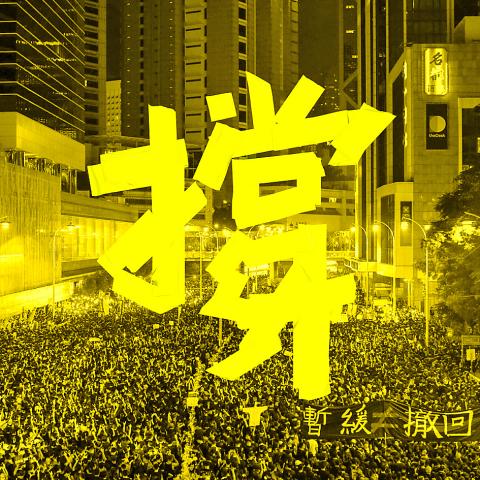More than 20 Taiwanese and Hong Kong singers, composers and other music professionals have produced a song in support of Hong Kongers opposing a proposed extradition bill, who are tomorrow to take to the streets again to demand the bill’s withdrawal.
The song, released on Friday, is titled Cheng (撐) in Mandarin, which roughly means “support” or “having one’s back.”
The character is part of the slogan Taiwan cheng Xianggang (“Taiwan supports Hong Kong,” 台灣撐香港), which was chanted by demonstrators who earlier this month rallied in Taiwan to support the Hong Kong protests.

Photo provided by Blaire Ko Music Studio
“The idea of producing the song came after some of us talked about [the protests] two weeks ago,” said award-winning Taiwanese music producer Blaire Ko (柯智豪), who oversaw the song’s production.
Ko said they came together just days after a large protest in Hong Kong on June 12.
The scale of the protests left a deep impression on him and many others, he said.
They also took action because they thought that the protests underscored the need for the world to pay attention to the suppression of freedoms, he said.
The music was composed by Poki Wu (吳永吉), the lead singer of Taiwanese rock band The Chairman (董事長樂團), and the lyrics were written by Golden Melody best songwriter award winner Wu Hsiung (武雄) and Hong Kong lyricist Albert Leung (林夕).
Others who took part in the project include Taiwanese indie band Fire Ex (滅火器), Amis singer Panai Kusui, Hong Kong Canto-pop singer Denise Ho (何韻詩) and Hong Kong singer and record producer Anthony Wong (黃耀明).
Through the song, they wanted to send the message that “no matter how small an individual is, they all aspire to have their own voice,” Ko said.
“Although it is raining now, we hope the road ahead will only be brighter and brighter,” he said.
The bill has raised concerns that it could threaten the rights of Hong Kongers, as it would allow the authorities to extradite criminal suspects to China.
The Hong Kong government on June 15 caved in to public pressure and indefinitely suspended the bill, but protesters deemed the move as a delaying tactic and demand that the bill be permanently withdrawn.

A strong continental cold air mass is to bring pollutants to Taiwan from tomorrow, the Ministry of Environment said today, as it issued an “orange” air quality alert for most of the country. All of Taiwan except for Hualien and Taitung counties is to be under an “orange” air quality alert tomorrow, indicating air quality that is unhealthy for sensitive groups. In China, areas from Shandong to Shanghai have been enveloped in haze since Saturday, the ministry said in a news release. Yesterday, hourly concentrations of PM2.5 in these areas ranged from 65 to 160 micrograms per cubic meter (mg/m³), and pollutants were

Taiwan’s armed forces have established response protocols for a wide range of sudden contingencies, including the “Wan Chun Plan” to protect the head of state, the Ministry of Defense (MND) said today. After US President Donald Trump on Saturday launched a series of airstrikes in Venezuela and kidnapped Venezuelan President Nicolas Maduro, concerns have been raised as to whether China would launch a similar “decapitation strike” on Taiwan. The armed forces regularly coordinate with relevant agencies and practice drills to ensure preparedness for a wide range of scenarios, Vice Minister of National Defense Hsu Szu-chien (徐斯儉) told reporters before a

EVA Airways on Saturday said that it had suspended a pilot and opened an investigation after he allegedly lost his temper and punched the first officer several times as their plane was taxiing before takeoff at Los Angeles International Airport. According to a report published on Thursday by The Reporter, the incident occurred after the flight’s Malaysian first officer tried to warn the Taiwanese pilot, surnamed Wen (文), that he was taxiing faster than the speed limit of 30 knots (55.6kph). After alerting the pilot several times without response, the first officer manually applied the brakes in accordance with standard operating

Japanese Councilor Hei Seki (石平) on Wednesday said that he plans to visit Taiwan, saying that would “prove that Taiwan is an independent country and does not belong to China.” Seki, a member of the Japan Innovation Party, was born in Chengdu in China’s Sichuan Province and became a naturalized Japanese in 2007. He was elected to the House of Concilors last year. His views on the Chinese Communist Party (CCP) — espoused in a series of books on politics and history — prompted Beijing to sanction him, including barring Seki from traveling to China. Seki wrote on X that he intends